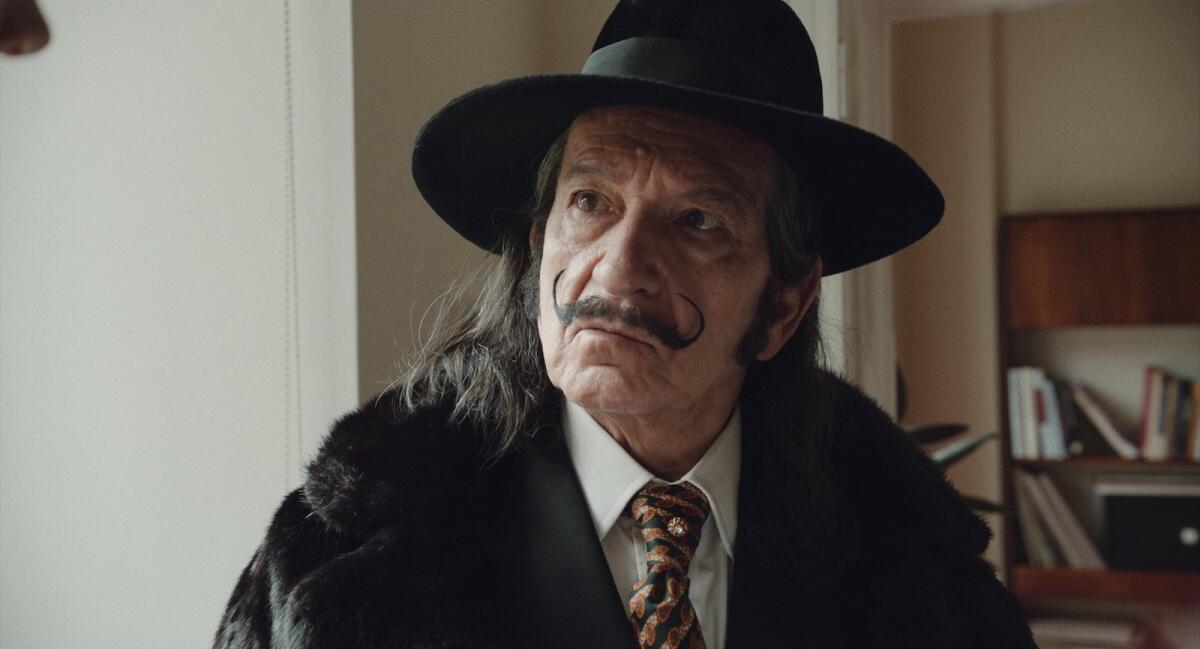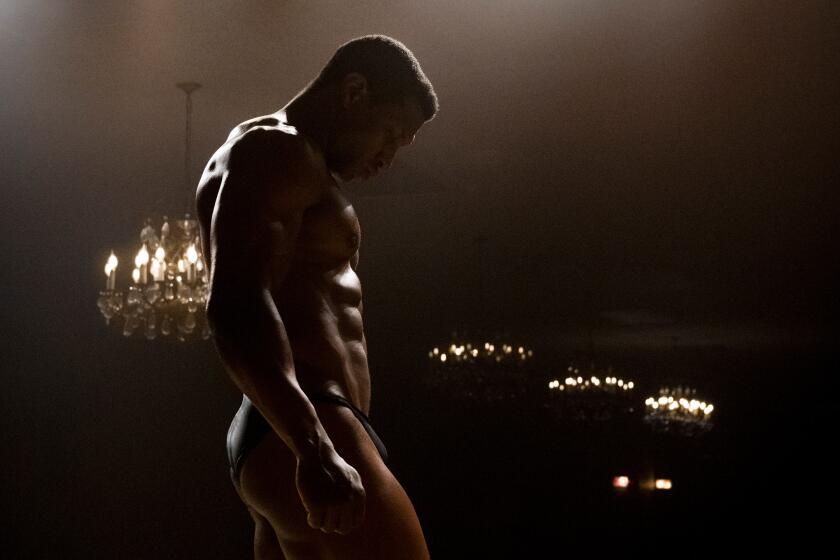‘Dalíland,’ art and the persistence of boredom

- Share via
Sometimes real historical figures are so grand and eccentric that, like the rare and special occurrence of a solar eclipse, it seems that one can only view them through a pinhole, their light too bright to fully take in. Such is the case in the biopic “Dalíland” — directed by Mary Harron, written by her husband, John C. Walsh — which is little more than a peek at the life of the legendary Spanish surrealist Salvador Dalí (Ben Kingsley) and his equally ostentatious wife, muse and manager, Gala (Barbara Sukowa).
To grant this glimpse, Harron and Walsh have crafted the least interesting pinhole to observe this vibrant, brilliant and volatile couple, inventing an innocent art enthusiast from Idaho, James (Christopher Briney), to be the audience surrogate of “Dalíland.”
Working for a gallerist during the heady disco days of 1973 New York, James crosses paths with Dalí and Gala as they’re holed up at the St. Regis hotel, coasting on fame, extracting as much social, cultural and actual capital as possible out of Dalí’s name. Their marriage is untraditional, the two carrying on outside dalliances to varying degrees, but they are utterly, happily codependent, as James will discover when he becomes Dalí’s assistant.
After breaking out in YA hit ‘The Summer I Turned Pretty,’ Christopher Briney makes his film debut opposite Ben Kingsley in ‘Dalíland’
Dalí’s work feeds Gala’s hunger for cash, and Gala is Dalí’s muse, the only one who can get him painting with a cuff about the ears, their outbursts of heated anger serving as grist for his inspiration mill. Somewhere in “Dalíland” is a far sharper film about this unusual pair, perhaps a fascinating and prickly portrait of art, marriage and money in the vein of “Phantom Thread,” with shades of dominance and submission in the couple’s consensual power play. But through James’ point of view, it’s just another coming-of-age tale for a young white man who finds himself tickled and intrigued by this seeming den of artistic iniquity.
James isn’t based on a real person, though he seems fashioned after a character like William Miller, the young rock journalist at the center of Cameron Crowe’s autobiographical “Almost Famous.” James even has his own Penny Lane in the form of Ginesta (Suki Waterhouse), a model, trust-fund baby and Dalí groupie who shows him the ropes of this brave new world of disco, drugs and deviant behavior. Unfortunately, these two are the most boring possible choice through which to explore the intimate affairs of Dalí’s world, including his uniquely voyeuristic sexuality.
It would be much more exciting to see Gala and Dalí unvarnished, simply as themselves as weird as they are, or through the eyes of Dalí’s other muse, the model-turned-disco-pop-star Amanda Lear (Andreja Pejic), who appears as a supporting character and benevolent ally to James as he navigates the difficult financial and emotional logistics of Gala and Dalí’s life. Even “Jesus Chris Superstar” himself, Jeff Fenholt (Zachary Nachbar-Seckel), one of Gala’s parasitic young paramours, would have made for a more complex point of view than the naif James, who exists only as a screenwriting device.
In addition to this milquetoast audience surrogate, Walsh scores a hat trick of biopic clichés with a 1980s-set frame that features Dalí on a rerun of “What’s My Line?,” as well as a series of flashbacks to Dalí and Gala’s life as wanton young lovers, in which the contemporary characters enter the scene to watch and comment on the memories. Young Dalí is played histrionically by Ezra Miller, the intense young Gala by Avital Lvova.
With all of this going on, it’s easy to take for granted what’s good about “Dalíland,” namely Gala and Dalí as played by Sukowa and Kingsley. Sukowa’s depiction of a Russian woman with a taste for drama and the finer things in life is over the top, but deadly accurate; Kingsley balances imperiousness and vulnerability beautifully and with an ease only he seems capable of achieving. Within the wild and wacky world of Dalíland, one never quite knows what’s a carefully crafted performance of a persona and what’s real, which is another layer to the conceptions of fame and identity in art that goes somewhat unexplored.
Harron’s direction is serviceable if a bit uninspired; the staging can be a bit staid, especially for such outsize figures as Gala and Dalí, known for his sprawling surrealist masterworks. But perhaps “Dalíland” is not about reaching to their imaginative heights, but rather bringing the pair back down to Earth, humanizing them as merely people with the same marriage and money problems as everyone else. It’s not as much fun, but it is real, except for James, of course.
Katie Walsh is a Tribune News Service film critic
‘Dalíland’
Not rated
Running time: 1 hour 37 minutes
Playing: Starts June 9, Landark Nuart, on demand and digital Friday
More to Read
Only good movies
Get the Indie Focus newsletter, Mark Olsen's weekly guide to the world of cinema.
You may occasionally receive promotional content from the Los Angeles Times.











